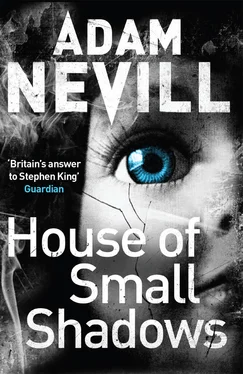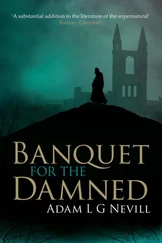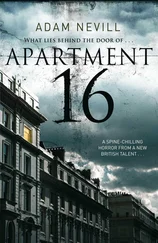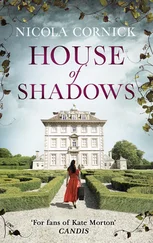She couldn’t imagine Glory selling for less than two hundred thousand pounds at auction. Gas Attack would fetch half of that. And there were another two Great War dioramas locked away on the ground floor of the house. There were the dolls too. His notorious puppets weren’t for sale, but she should at least see them and persuade Edith to exhibit if her uncle’s skill in their creation was anything like his preservation of rats.
Again, she wondered why she was here, as if there had been a mistake and she had someone else’s identity and she should confess her status as imposter before it was all too late. She was giddy and weightless from excitement or shock, but wasn’t sure which. Her clothes clung thin and cheap, everything about herself was inappropriate here. She was out of her depth. She wasn’t a quick girl, she didn’t pounce on opportunities. She bit her lip. Stopped herself.
‘Ms Mason?’ she suddenly thought to ask, as she pushed the wheelchair through the dark passage to the reddish hue of the distant hall. ‘Who is the child?’
Edith stayed quiet for a while as if she hadn’t heard. ‘Child?’
‘Yes. At the window. I saw someone before I came inside.’
‘What?’ Beneath her in the heavy chair, the great powdered head turned to one side. ‘There is no child,’ she added as if Catherine had said something idiotic to someone elderly and irritable, which she surmised she may have done. Particularly if it had been Edith at the window. But it couldn’t have been .
‘Climbing, I think—’
‘Climbing? What do you mean? There is only me here. And Maude. And as you can see…’ She opened the palms of her frail gloved hands as if to indicate the existence of the wheelchair.
‘And in the room…’
‘What are you talking about? What room?’
They reached the hall. ‘The room with Glory . There was a noise. A sound. I thought—’
‘The bird? There are birds in all of our chimneys. We cannot get them out.’ Edith raised her little bell and began to shake it feebly.
Catherine reached down to help her.
‘Leave it!’
From deep inside the Red House a door opened and Catherine recognized the shuffle of Maude’s old, tired feet.
After Edith and her chair had been fitted into the stairlift by Maude, amidst protestations and much supervision that Catherine thought unnecessary, and once Edith and her chair had begun a steady though noisy climb upwards, the ancient woman regarded Catherine one final time with her small red-rimmed eyes. ‘I will remind you not to mention what you have seen inside this house. It is private. They are still our things. We do not want callers.’
Catherine couldn’t wait to get home and tell Mike. ‘Of course. The visit is confidential.’
Edith continued to stare at her with an unpleasant intensity. Catherine dropped her eyes to Maude who looked through Catherine. The housekeeper’s gaze was directed at the vestibule before the front door.
‘Goodbye,’ Catherine called out to the diminutive figure of Edith Mason, trembling on its rattling ascent. There was no answer. ‘And thank you again.’
In silence, Maude showed Catherine to the front of the house. She’d wanted to flee for most of the time she had been inside the building, but now identified a frustrated desire to stay and see more. She had been spoiled, but also teased.
At the threshold of the Red House, the housekeeper looked over her shoulder quickly, back towards the hall and the strained sounds of the stairlift. And without looking at Catherine, Maude clutched one of her hands and pressed her mannish fingers into Catherine’s palm, to leave a piece of paper behind.
‘Oh no, you don’t have to…’ Catherine said to a closing, and then a shut door, thinking the housekeeper had tipped her like a tradesman. It wouldn’t have surprised her if these two isolated and out-of-touch figures still observed such a custom, but when she bent over to chase the paper that had fluttered from her hand and come to rest on the tiles of the porch, she could see that it wasn’t money. It was a crumpled piece of brown paper.
Beyond the thick door came the muted yet frantic peal of the handbell.
Catherine picked the paper up and straightened it out. It was spattered with what looked like grease. She turned it over. Written in pencil in stubby capitals were four words. DON’T NEVER COME BACK.
Twice her wheels bumped across catseyes as if she had fallen asleep at the wheel. Late afternoon, but her journey home resembled a familiar route retraced in darkness. The fugue of the great house’s interior remained thick inside her mind. Her place in the world felt odd too, as though she was returning to an old neighbourhood where she was no longer remembered.
Beyond the meadows of the Red House the world suggested only the bland and temporary to her imagination. The city she returned to seemed predictable and disappointing. The British Museum had a similar effect upon her heart, during all of those Sunday afternoons she spent there to escape the dismal rooms she’d rented in London.
Adjusting to the sight of dual carriageways, and their service stations, and garden centres near Worcester, required a conscious effort, that seemed more about regaining familiarity with the terrain than her experience of the Red House should warrant.
The impact of the house’s strangeness and the incongruity of her place inside it combined uncomfortably with her memories of alienation as a child in Ellyll Fields. Feelings she didn’t want stirred tugged at her heart again. Near Hereford, she even entertained the idea of never returning to Magbar Wood and the neighbouring Red House. She tried to think of excuses she could make to Leonard. In a spurt of sickly panic that surged from a defensive instinct she’d been trained in therapy to repel, she briefly considered running somewhere new and not coming back. But where was left?
Parked outside her flat in Worcester, getting out of the car was like waking from a deep sleep only to leave part of herself inside a dream. A physical reassembly of herself seemed necessary before she could climb out of the car. Inside her flat, finding affection for her furniture and belongings was a struggle.
She had been uncomfortable and struck dumb in either shock or wonderment for the entire duration of her visit to the Mason house, but had left eager to return and see more. Until Maude gave her the note. The note was the trigger.
She left the note inside her bag. She didn’t want to see the handwriting again. It was bully writing. Blunt, direct, designed to upset, unnerve, and linger long after the perpetrators had fled the scene. She’d show it to Edith. Or should she not?
The note could be nothing more than territorial spite directed at an imposter. Maybe she had been a glaring and awful reminder of out there, a thing creeping inside to cheat an old lady. Or was the note a warning? But of what? A ninety-three-year-old woman?
You don’t have time for this now.
Catherine identified the cognitive root of where the imagined persecution bled. Some days everything was a trip-wire to set off paranoia. She derailed the irrational train of thought before it left the platform to shriek though her mind at InterCity speed.
An auction fraught with pressure, expectation, and a high profile she might be unequal to awaited, as well as her having to manage a difficult character. There was no escaping that. The note from Maude didn’t help matters, and visiting the Red House was hardly a common experience. So it was natural to feel strange, disorientated. That’s all it is. Relax. See things as they actually are.
Mike didn’t like her in this mood either. He found her ‘exhausting’. The last therapist’s exercises worked if she made an effort. But only the excitement involved in getting ready to meet Mike succeeded in finally acclimatizing her to the world she’d stepped entirely away from, on the lane before the great house of M. H. Mason.
Читать дальше












